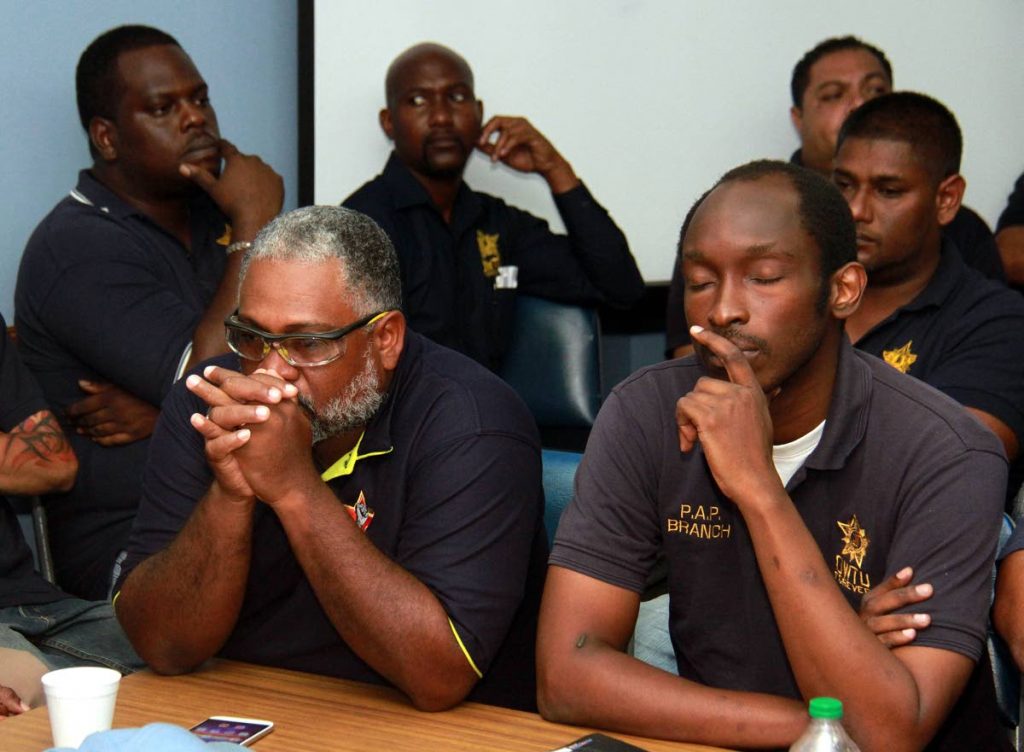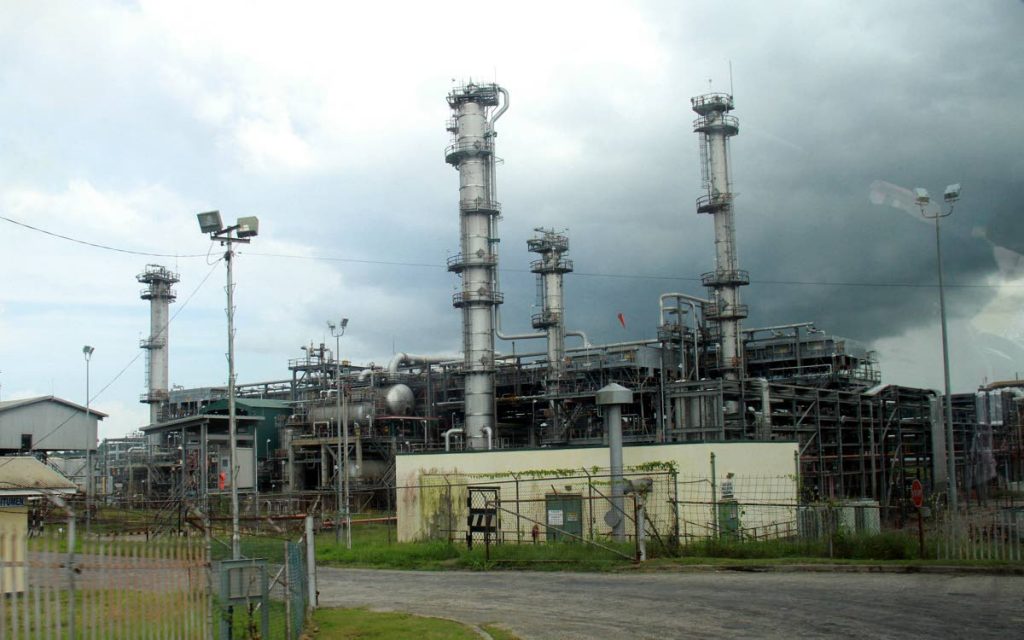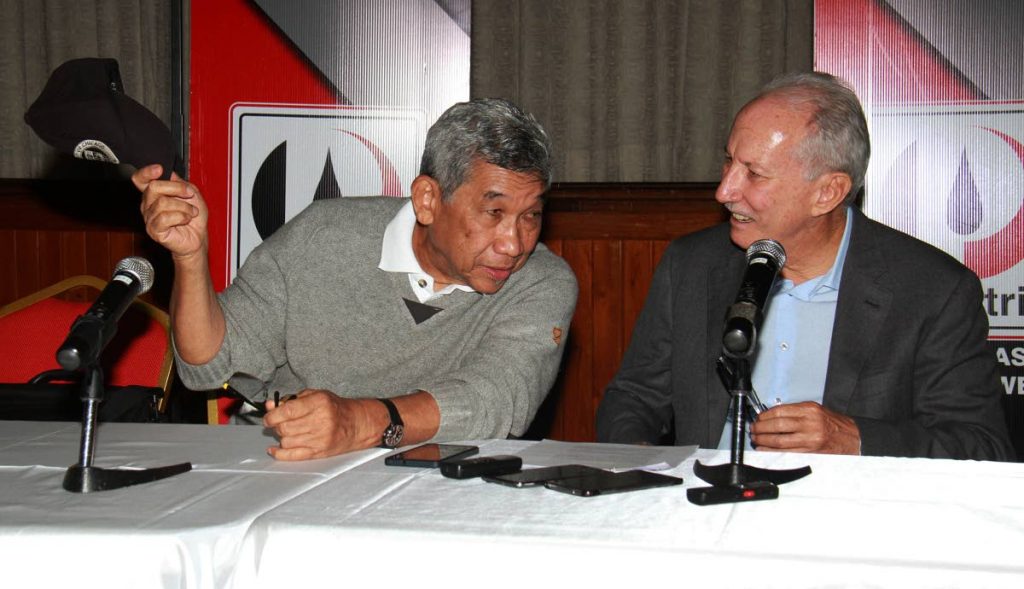Road to hard times

HOW did we get here? That’s the question many people are asking about Petrotrin’s announcement this past Tuesday that – starting October 1 – the state oil company will phase out operations at its refinery in Pointe-a-Pierre.
The Prime Minister is set to address the nation about this momentous decision today – the timing of which has been criticised by some, such as Opposition Leader Kamla Persad-Bissessar. Dr Rowley’s critics said he waited too long to speak publicly about Petrotrin’s decision – as part of its restructuring plans – to close the country’s sole remaining oil refinery.
The closure will affect an estimated 2,500 jobs, with all 1,700 refinery employees being sent home and the company importing refined products instead of making them using majority imported oil.

Gasoline, diesel, super, premium and aviation fuels are chief among the refined products TT will have to import once the refinery is shut down.
Having officially informed the Oilfields Workers Trade Union (OWTU) on Tuesday of its plans, Petrotrin’s Wilfred Espinet-led board said it was “taking all requisite steps to facilitate a smooth and efficient period of transition with safety and the security of the country’s fuel supply being its two priorities.”
Petrotrin also said it would meet with all stakeholders during the coming weeks to discuss how the proposed changes may affect them.
MARCH 2017
The PM established a specialist committee to examine Petrotrin and determine the way forward for the company. The committee was chaired by the then permanent secretary in the Energy Ministry, Selwyn Lashley.
SEPTEMBER 2017 - NEW LEADERSHIP
Over the years, there have been suggestions on how to solve Petrotrin’s financial woes, if to upgrade or replace its ageing infrastructure yet nothing much seemed to change.
That is until September 2017 when Rowley announced a new board was being installed to restructure and turn around the company within two to three years.
Rowley said the nine-member board, headed by businessman Wilfred Espinet, with Reynold Adjodhasingh as vice chairman, was chosen for its business experience as well as deep knowledge of Petrotrin.
The board also comprises Nigel Edwards, Anthony Chan Tack, Eustace Nancis, Joel Harding, Linda Rajpaul, Randhir Rampersad and Lashley.
In what may have been a foreshadowing of things to come, the PM spoke of the burden of Petrotrin’s dated refinery on the State’s limited coffers.
He said it was refining crude at a loss at current level of oil prices and that because of the company’s serious financial situation, Finance Minister Colm Imbert had been forced to pay for imports of crude oil to keep the refinery operating while it was losing money on each barrel of oil that it produced. Rowley also reminded that Petrotrin had two bond payments due – a US$850 bond due in August 2019 and a US$750 million bond due in May 2022. He expressed concern about Petrotrin’s ageing infrastructure which carried the risk of safety and the possibility of leaks polluting the Gulf of Paria and the Venezuelan coastline – something which Rowley said he worried about because it would have huge consequences.
OCTOBER 2017
It’s sometimes said that for a country whose economy is largely dependent on oil and gas, many “Trinis” don’t know that much about the state of the energy sector or how their lives are affected by it.
Not so much in the case of Petrotrin, as the company, union and even government officials regularly made statements, held press conferences and the like, to highlight the latest developments.
Case in point, Energy Minister Franklin Khan’s contribution to the 2017-2018 budget debate in the Senate in late October last year.
Describing the situation as “not a nice story”, Khan said with a “whopping $13 billion debt profile,” Petrotrin had gone from being a profitable company many years ago to one riddled with a plethora of problems. Namely very limited working capital, operating losses, poor asset integrity and extremely high operating costs.
DECEMBER 2017
Petrotrin’s president Fitzroy Harewood submitted his resignation on November 30 to allow time for a replacement to be found – his resignation took effect on February 28 this year.
No reasons were given for his departure in the staff circular issued by Espinet yet Harewood’s resignation came weeks after a report found that the “fake oil” scandal was real.
Later in December, Petrotrin announced the termination of its contract with A&V Drilling and Workover Ltd.
The lease operator was at the centre of the “fake oil” scandal at Petrotrin. In a statement, Petrotrin said the findings of its audit department had been confirmed by an independent, forensic audit conducted by Canadian consultancy firm, Kroll Consulting Canada Company. The Kroll audit was commissioned by Petrotrin’s board of directors.
Another report from Gaffney Cline advised that the reservoir from which the oil had been produced was incapable of yielding the reported volumes
JANUARY 2018
Petrotrin’s board submitted a status report to Rowley in early January – about its restructuring plan – during a meeting at the Office of the Prime Minister (OPM), St Clair.
Present then was Khan, Minister in the Ministry of Finance Allyson West, Public Utilities Minister Robert Le Hunte and Planning Minister Camille Robinson-Regis. Discussions focused on options available for restructuring the wholly state-owned company.
Following its September 2017 installation, the Espinet board had been considering a report from the Petrotrin Review Committee chaired by Lashley. In addition to identifying challenges, risks and shortcomings, the report recommended establishment of three operationally independent business units within the company: Trinmar, Land Exploration, Production Refining and Marketing.
FEBRUARY 2018
At a special meeting of its board on February 28, members approved the establishment of an internal Oversight Team. Petrotrin said the team would have caretaker and oversight responsibility for designated areas of operations of the company during the interim period as follows:
Chairman Wilfred Espinet – human resources, corporate services and all direct reports (except MHSE) who previously reported to the president; deputy chairman Reynold Adjodhasingh – finance; director Anthony Chan Tack – refining and marketing; and adviser Robert Riley – exploration and production/HSE.

PHOTO BY ANIL RAMPERSAD.
MARCH 2018
On March 1, Petrotrin set up a transition team as part of its major restructuring, including splitting the company in two. One entity focused on exploration and production while the other focused on refining and marketing, headed by chairman Espinet.
APRIL 2018
OWTU and Petrotrin signed a memorandum of agreement (MoA) on April 3 to establish a working committee to oversee the restructuring of the struggling oil company over the next 18 months.
Roget at the time spoke optimistically about it, saying the restructuring exercise would be better executed because the union was now involved.
“We were able to sign an MoA detailing how this company is going to be divided, the work that is going to be done and the time-frame which we have to complete the reorganising of the company. Rest assured, you the public of TT, that (Petrotrin) is in good hands and we will ensure that this company is here to stay for the benefit of all,” Roget said.
The MoA paved the way for the division of Petrotrin into four entities – as proposed by the OWTU – with a goal of returning the company to profitability. They were: Land – north and east – (LNE), Trinmar offshore operations; exploration and production; and the Augustus Long Hospital in Pointe-a-Pierre.
Roget said the company and union were to hold monthly meetings, starting that same month, with the goal of “enhancement of operational efficiencies, reduction of waste and the promotion of the business of the company.”
JUNE 2018
Criticism of how the restructuring efforts were going and what information was being made public came from several quarters.
In June, Pointe-a-Pierre MP and UNC chairman David Lee questioned why nearly $64 million was spent on consultants between July 2017 and June 2018, when Petrotrin had recorded a $2.1 billion loss in 2017.
Lee obtained the information in a written response from the Energy Minister to a question he filed in Parliament back in April. Lee had asked for the names of individuals or companies who had been retained as consultants by Petrotrin, as well as their fees. The total for all 16 was $63,610,158.33. The bulk of that went to one company, McKinsey & Co, Inc, who received $28 million for “company strategic review and transition.”
“After spending $63 million in 11 months our citizens would have hoped that Petrotrin’s rating may have increased, its ability to pay its large debts would have improved and there would have been a larger impact on the company’s productivity than stated by (Khan) in the past year. However this has not been the case,” Lee said.
He said despite the McKinsey payment, “up to this day, the Government has not been upfront with the nation on Petrotrin’s true state of affairs” and what its transition would include.
JULY 2018
Declaring politics and oil do not mix, Trinmar’s branch president Ernesto Kesar accused Petrotrin executives of violating the terms of the MoA.
“Since the MoA was signed, we have not met with any members of the board to effectively implement the tenets of this memorandum. If that is not deception and disingenuous behaviour, then I don’t know what it is comrades.”
Kesar was at the time addressing OWTU members during a placard protest at the gates of Petrotrin’s administrative building at Main Road, Point Fortin.
Citing corruption as the “sole reason why Petrotrin is in the state it is today,” Kesar said OWTU welcomed restructuring but with the union’s involvement.
He said despite challenges workers face, they still do their jobs and contribute significantly to the economy. Based on a report by TT Extractive Industries Transparency Initiative 2011 to 2017, Kesar said it has been estimated that Petrotrin contributed some $16 billion-plus to the economy.
The OWTU called for a thorough investigation of all reports of corruption and prosecution of those culpable of crimes committed in the company.
JULY 2018
That same month, Roget called for Espinet’s removal, claiming the Petrotrin chairman was placing the lives of Petrotrin workers in danger by peddling false information about their salaries.
In advertisements published in the press in late June, Petrotrin shared details of its financial status, enumerating its overall performance, employee costs, including overtime and vacation payouts, and debt.
The ads were published two weeks after Petrotrin announced a $85.6 million profit for the first third quarter of financial year 2018, despite an overall loss of $500.7 million for the first nine months.
The heavily debt-burdened entity had managed to make a $461 million operating profit for the year to date.
The company attributed its reversal to slashing discretionary spending that was not adding tangible benefits to the operations. This was still eclipsed by its overwhelming finance costs, including debt payments, which amounted to $703.8 million.
Petrotrin’s wage bill is another burden on the company’s profitability—one that continuously puts the company and its majority union, the Oilfield Workers’ Trade Union at loggerheads.
The ad said that as of June 30, salaries and wages were 52.8 per cent of Petrotrin’s operating cost:
* $2.19 billion out of $4.15 billion.
* 3,437 permanent employees cost $1.87 billion annually, an average of $544,370 per employee, or $45,000 a month.
* 1,229 on-permanent employees cost $320 million— $260,374 per employee or about $21,000 a month
* Overtime bill for 2016 and 2017 averaged $22.7 million per month.
* Workers have collectively accrued 180,090 vacation days, valued at $213 million.
The OWTU has persistently maintained that it is unfair for the company to cite the wage bill as a drag on revenue when key roles in field operations, exploration and production and refining are vacant, putting extra strain on existing staff. At the same time, areas like corporate communications and human resources are overstaffed.
AUGUST 21, 2018
On August 21, Roget and The PM met at the OPM to discuss the restructuring process but at the end of nearly three hours of talks, Roget said no real progress had been made.
He then urged workers to pray, as he expected job cuts would be forthcoming. Roget said based on the union’s understanding of what Rowley told them, “Cabinet has accepted that Petrotrin workers should go home in some shape or form.”
Rowley said workers would not be “placed on the pavement,” but would “get proper compensation,” he said.
“Now what does that mean? You don’t compensate people if they staying in their job,” Roget added.
He reiterated the union’s call for vacancies at the company to be filled, which he argued would help boost Petrotrin’s production levels. He lamented that the board had apparently instead decided on job cuts.
AUGUST 27, 2018
At a press conference on short notice last Sunday, the Energy Minister declared Petrotrin was facing “a black hole (that) could bankrupt this country” if things remained the same.
He called for maturity, pragmatism and patriotism on all sides in restructuring the company.
“Petrotrin has served us well in the past,” he said. Khan was optimistic that “with the right programme, right leadership and more importantly the right intervention, (Petrotrin) can continue to serve us well into the future.”
Petrotrin and the OWTU met this past Tuesday to discuss the restructuring plan for the company. Khan said this meeting would also outline “what consequences will follow and the way forward for a restructured Petrotrin.”


Comments
"Road to hard times"